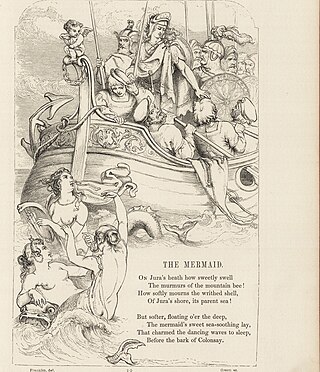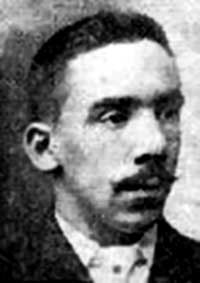
"Turkey in the Straw" is an American folk song that first gained popularity in the 19th century. Early versions of the song were titled "Zip Coon", which were first published around 1834 and performed in minstrel shows, with different people claiming authorship of the song. The melody of "Zip Coon" later became known as "Turkey in the Straw"; a song titled "Turkey in de Straw" with different music and lyrics was published in 1861 together with the wordless music of "Zip Coon" added at the end, and the title "Turkey in the Straw" then became linked to the tune of "Zip Coon".

Violet Constance Jessop was an Irish-Argentine ocean liner stewardess and Voluntary Aid Detachment nurse in the early 20th century. Jessop is best known for having survived the sinking of both RMS Titanic in 1912 and her sister ship HMHS Britannic in 1916, as well as having been aboard the eldest of the three sister ships, RMS Olympic, when it collided with the British warship HMS Hawke in 1911.

Wallace Henry Hartley was an English violinist and bandleader on the Titanic during its maiden voyage. He became famous for leading the eight-member band as the ship sank on 15 April 1912. He and the rest of the band did not survive the sinking.

On April 14, 1912, the Titanic collided with an iceberg, damaging the hull's plates below the waterline on the starboard side, causing the front compartments to flood. The ship then sank two hours and forty minutes later, with approximately 1,496 fatalities as a result of drowning or hypothermia. Since then, many conspiracy theories have been suggested regarding the disaster. These theories have been refuted by subject-matter experts.

"Nearer, My God, to Thee" is a 19th-century Christian hymn by Sarah Flower Adams, which retells the story of Jacob's dream. Genesis 28:11–12 can be translated as follows: "So he came to a certain place and stayed there all night because the sun had set. And he took one of the stones of that place and put it at his head, and he lay down in that place to sleep. Then he dreamed, and behold, a ladder was set up on the earth, and its top reached to heaven; and there the angels of God were ascending and descending on it..."

"The Mermaid" is a traditional folk ballad. Originating around the mid-18th century, this song is known by a number of names, including "Waves on the Sea", "The Stormy Winds", "Our Gallant Ship", and "The Wrecked Ship".
"Go Tell It on the Mountain" is an African-American spiritual song and Christmas carol which was most likely derived from the oral tradition, but was first printed in an early-1900s compilation of African-American folk songs. It has been sung and recorded by many gospel and secular performers.

The Titanic has played a prominent role in popular culture since her sinking in 1912, with the loss of almost 1,500 of the 2,224 lives on board. The disaster and the Titanic herself have been objects of public fascination for many years. They have inspired numerous books, plays, films, songs, poems, and works of art. The story has been interpreted in many overlapping ways, including as a symbol of technological hubris, as basis for fail-safe improvements, as a classic disaster tale, as an indictment of the class divisions of the time, and as romantic tragedies with personal heroism. It has inspired many moral, social and political metaphors and is regularly invoked as a cautionary tale of the limitations of modernity and ambition.

RMS Titanic sank on 15 April 1912 in the North Atlantic Ocean. The largest ocean liner in service at the time, Titanic was four days into her maiden voyage from Southampton, England, to New York City, with an estimated 2,224 people on board when she struck an iceberg at 23:40 on 14 April. Her sinking two hours and forty minutes later at 02:20 ship's time on 15 April resulted in the deaths of more than 1,500 people, making it one of the deadliest peacetime maritime disasters in history.

Charles John Joughin was a British-American chef, known as being the chief baker aboard the RMS Titanic. He survived the ship's sinking, and became notable for having survived in the frigid water for an exceptionally long time before being pulled onto the overturned Collapsible B lifeboat with virtually no ill effects.
"Take This Hammer" is a prison, logging, and railroad work song, which has the same Roud number as another song, "Nine Pound Hammer", with which it shares verses. "Swannanoa Tunnel" and "Asheville Junction" are similar. Together, this group of songs are referred to as "hammer songs" or "roll songs". Numerous bluegrass bands and singers like Scott McGill and Mississippi John Hurt also recorded commercial versions of this song, nearly all of them containing verses about the legendary railroad worker, John Henry; and even when they do not, writes folklorist Kip Lornell, "one feels his strong and valorous presence in the song".
"I'm Alabama Bound" is a ragtime melody composed by Robert Hoffman in 1909. Hoffman dedicated it to an M. T. Scarlata. The cover of its first edition, published by Robert Ebberman, New Orleans, 1909, advertises the music as "Also Known As The Alabama Blues" which has led some to suspect it of being one of the first blues songs. However, as written, it is an up-tempo rag with no associated lyrics. The song has been recorded numerous times in different styles—both written and in sound recordings—with a number of different sets of lyrics.
"Wasn't That a Mighty Storm" is an American folk song concerning the 1900 hurricane that destroyed Galveston, Texas. It was revived and popularized by Eric Von Schmidt and Tom Rush in the 1960s, and later by the bluegrass musician Tony Rice.

There have been several legends and myths surrounding the RMS Titanic and its destruction after colliding with an iceberg in the Atlantic Ocean. These have ranged from stories involving the myth about the ship having been described as "unsinkable" to the myth concerning the final song played by the ship's musicians.

Lifeboats played a crucial role during the sinking of the Titanic on 14–15 April 1912. The ship had 20 lifeboats that, in total, could accommodate 1,178 people, a little over half of the 2,209 on board the night it sank. 18 lifeboats were used, loading between 11:45 P.M. and 2:05 A.M., though Collapsible Boat A floated off the ship's partially submerged deck and Collapsible Boat B floated away upside down minutes before the ship upended and sank.
The Sinking of the Titanic is a work by British minimalist composer Gavin Bryars. Inspired by the story that the band on the RMS Titanic continued to perform as the ship sank in 1912, it imagines how the music performed by the band would reverberate through the water some time after they ceased performing. Composed between 1969 and 1972, the work is now considered one of the classics of British classical experimental music.
The ocean liner Titanic has been extensively portrayed in films, books, memorials and museums.
"Tempest" is an epic modern folk song about the sinking of the RMS Titanic written and performed by American singer-songwriter Bob Dylan. It appears as the ninth track on his 2012 studio album of the same title. Like much of Dylan's 21st-century output, he produced the song himself using the pseudonym Jack Frost.

"When the War Was On" is a call and response blues song recorded in 1929 by Blind Willie Johnson and Willis B. Harris, who is thought to have been his first wife. Johnson plays bottleneck guitar, and sings throughout in his "growl" voice; Harris sings soprano.

The unnamed iceberg that sank the Titanic collided with the ship on the night of 14–15 April 1912 in the North Atlantic. Of the approximate 2,200 people on board, over 1,500 did not survive. After the disaster, there was interest in the iceberg itself to explain the circumstances of the collision and the resulting damage to the supposedly unsinkable ship. As a result of the Titanic disaster, an International Ice Patrol was founded whose mission was to reduce the dangers of ice to shipping.












